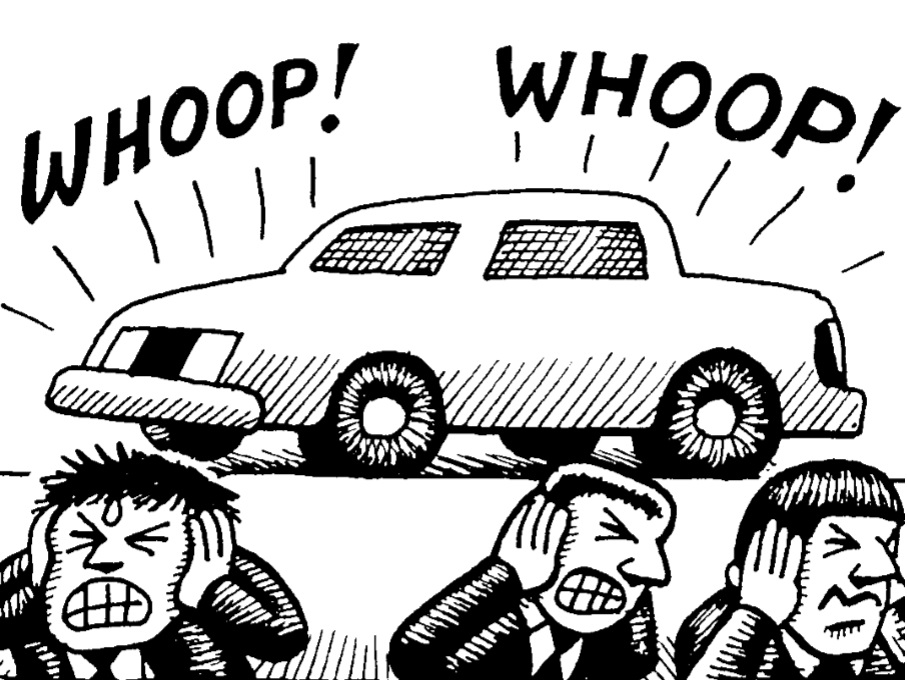| |||
| It's too late to "prevent" the sounds of car alarms, backup beeping in passenger cars, and car locking with horn sounds. But we can change the path of "noise history" by participating in a public comment period related to acoustic vehicel alerting sounds - AVAS - for quiet cars. Your comment will not prevent AVAS from raising sound levels in certain contexts. But it will address a choice that could potentially reduce sound quality in cities, small towns, and national parks throughout North America. | |||
| The Pedestrian Safety Enhancement Act of 2010 mandated that electric and hybrid cars be manufactured with sound that will be emitted outside of the car so that visually impaired people will have some kind of warning to signal that a "quiet car" is approaching. This makes sense in many contexts, as long as the added sound resembles the sound of a car and is no louder than necessary. But some owners complained about "not having a choice of sounds," and now the National Highway Traffic Safety Administration (NHTSA) has proposed that automakers give car owners a choice of sounds rather than a standard sound for approach, a standard sound for backup, and so on. | |||
| Automakers should use standard sound signals for regulated minimum sound requirements in quiet cars for each direction. The sound should be similar to that of a vehicle engine. Backup sound indicators should be as low as reasonably achievable, rather than loud industrial grade beep sounds that travel more than a mile in the wilderness. And NHTSA should make a serious effort to obtain feedback from the public. | |||
| The public did have a chance to comment when AVAS sounds were first introduced. But although there were 234,564,000 Americans over the age of 18 at the time, fewer than 100 individuals or companies submitted comments about the acoustic alerts that would be used with AVAS. Automakers, regulatory agencies like NHTSA, the Alliance of Automobile Manufacturers (Auto Alliance), Global Automakers, and the Society of Automobile Engineers (SAE International) don't recognize the public as stakeholders when considering vehicle noise issues, because they seem not to understand how close we live to cars. | |||
| The mandate for AVAS in quiet cars was intended to protect blind and visually impaired people, as well as other pedestrians, and cyclists, not to fulfill the wishes of car owners. Imagine having to learn more than a dozen sound effects and recognize them as cars - wouldn't it be easier if each of them sounded like a car? | |||
| A concern of stakeholders is that unhappy owners will tamper with their cars' sound to eliminate it. But that's already happening because some owners dislike having horns sounds as non-emergency warnings that wake the dead, or industrial grade backup beeping that pierces the stillness of a quiet night. A manual created by a Silence the Horns supporter who disliked the added sound of his new LEAF has been downloaded more than 600 times, and there are thousands of online forums where car owners share advice about eliminating "neighbor waking" sounds. | |||
| This is a "once in a lifetime" opportunity, although it should be a regular part of automotive product development. Please set aside time to learn about the Pedestrian Safety Enhancement Act, disability rights activism that led to the Act, minimum sound requirements, AVAS, and the long and winding road that led us here, and submit your comment before November 1, 2019. Comments do not post instantly, so only submit once. It can take up to two business days for comments to post, so plan on submitting well before October 31. | |||
| "It seems imperative to investigate the effects of multiple superimposed synthetic signals and the resulting detectability and recognizability of electric and hybrid cars before all regulations are fixed, instead of focusing only on single pass-by events" - Klaus Genuit | |||
| Sample sounds Jaguar I-PACE Mercedes Benz e-sound Audi e-tron artificial sound Brigade Electronics Quiet Vehicle Sounder Further reading | Dawn of the noisy electric car Signals to noise in acoustic vehicles alerting systems What will be the influence of e-mobility on soundscape? You may get the option to choose what your EV sounds like Horns of plenty: concerns raised about electric car alert systems Should hybrid and electric vehicles have acoustic alerting systems? The sound of an electrical vehicle - its contribution to a new urban soundscape Are vehicles driven in electric mode so quiet that they need acoustic warning signals? Electric car owners could choose which fake sounds their cars make under new proposal Upgrading backup alarms to reduce encroachment on soundscapes in Denali National Park | |
| Home | |
|
About | |
|
Editorial | |
|
Supporters | |
|
Write! | |
|
Quiet Locking |
 Illustration by
Illustration by